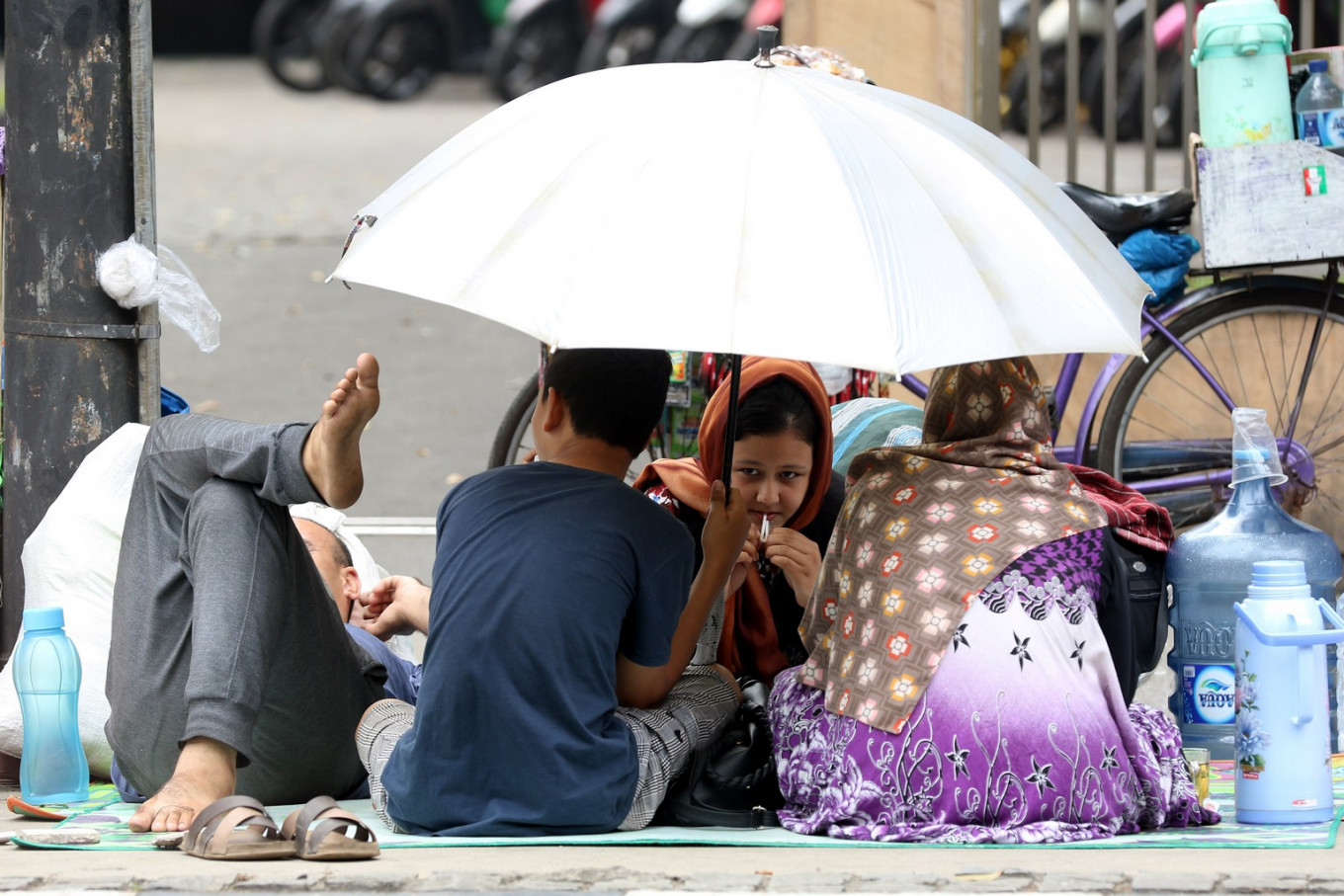Popular Reads
Top Results
Can't find what you're looking for?
View all search resultsPopular Reads
Top Results
Can't find what you're looking for?
View all search resultsDespite conventions refugees still lack rights
Change text size
Gift Premium Articles
to Anyone
W
orld Refugee Day, which occurred on June 20, has provided an opportunity for activists to urge the government to do more to uphold the human rights of refugees, most of whom arrive in Indonesia seeking resettlement in third countries.
Activists have pointed out that Indonesia is part of many international and regional human rights conventions to ensure the rights of refugees, even though the government did not sign the 1951 Refugee Convention, which obliges members to take in and take care of refugees.
Indonesia is party to the International Covenant on Economic, Social and Cultural Rights (ICESCR), the International Covenant on Civil and Political Rights (ICCPR) and others rights agreements.
“The government can and should do better,” said Zico Pestalozzi of the Indonesian Civil Society Association for the Protection of Refugee Rights (SUAKA) on Monday.
“And this is not only for the benefit of refugees but also the government itself. Seeing the refugee as the problem is the problem.”
Zico’s appeal echoed the desires of thousands of refugees who have long been struggling to obtain better access to basic rights in Indonesia as they wait to be resettled in other countries, usually after fleeing conflict or persecution in their home countries.
Indonesia was hosting 13,534 refugees as of May, according to the United Nations High Commissioner for Refugees (UNCHR).
“We do not have the right to get a formal education, to do legal work or to travel to any place in Indonesia,” said Afghanistan-born refugee Sikandar Ali during a recent virtual public discussion.
Read also: UNHCR works to ensure no refugees left behind in COVID-19 crisis in Indonesia
With no domestic law to regulate refugees, Indonesia issued a presidential regulation in 2016 to provide legal certainty and standards for government agencies to coordinate the handling of refugees. The government has also formed a refugee task force to mitigate refugee issues in Indonesia.
The 2016 regulation, however, requires international organizations, such as the UNHCR and the International Organization for Migration (IOM), to be central in the provision of basic needs for refugees, such as clean water, food, clothing, health care and hygiene.
Civil society groups have said the regulation establishes bureaucratic processes rather than protections for refugee rights.
Roswita Kristy of the Indonesia Jesuit Refugee Service said refugees in the country had not been included in the government’s COVID-19 response program. She said the government had provided refugees little access to information about the outbreak. Instead, they had to rely on nongovernmental organizations to translate information about the disease into their languages.
Globally, nearly 80 million people worldwide, or 1 percent of humanity, had been uprooted at the end of 2019 after fleeing wars or persecution, with fewer and fewer of those who fled able to return home, a UNHCR report released on Thursday found.
“We need a fundamentally new and more accepting attitude towards all who flee, coupled with a much more determined drive to unlock conflicts that go on for years and that are at the root of such immense suffering,” UN high commissioner for refugees Filippo Grandi said in a statement.
Read also: Record 79.5 million displaced at year-end despite COVID slowing exodus: UN
Foreign Ministry director for human rights Achsanul Habib said Indonesia had “gone the extra mile” in handling refugees even though it had no international obligation to do so, citing efforts to provide shelters to Rohingya refugees as an example.
He said several signatories to the 1951 Refugee Convention had begun gradually to neglect their responsibility to accommodate refugees. Therefore, he said, if Indonesia ratified the convention, it would have to bear the burden of those countries in addition to its own problems.
“Are we ready to take on [such a responsibility]?” Achsanul said.
Last year, the Medan Education Agency in North Sumatra worked with the IOM to allow refugee children to enroll in the state school system. A similar program has also been adopted in Pekanbaru, Riau.
Read also: Rohingya refugees rejected everywhere as countries grapple with COVID-19 concerns
Some refugees have taken the initiative themselves. For instance, refugees in Cisarua, West Java, have been running a learning center since 2014 to educate adults and children. The center is now holding workshops online because the COVID-19 pandemic has forced in-person sessions to stop.
Another refugee-led community center known as Sisterhood is offering online classes for female refugees. These include English, aerobics and knitting classes.
Somalian refugee Nimo Ali, who serves as Sisterhood’s activity design manager, said the organization had distributed basic food supplies to refugees and their Indonesian neighbors. This, she said, had helped them earn mutual respect.
Nimo recalled that she was initially shocked when strangers called her names, such as orang luar negeri (outsider) or orang hitam (dark-skinned person).
“Bad nicknames aside, they are nice people and have good hearts,” she said. “Now our nickname has changed to a sweet one. Now, I am hitam manis [sweet dark-skinned person].”










